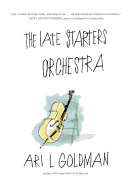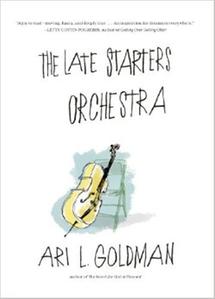
 It's doubtful former New York Times reporter turned Columbia University journalism professor Ari Goldman (The Search for God at Harvard; Living a Year of Kaddish) set out to produce a self-help manual when he began this engaging account of his return to playing the cello after a hiatus of more than two decades. Still, it will be a surprise if his story doesn't inspire at least a few baby boomers to dive into the chaos of a messy closet to find a long-abandoned musical instrument, determined to prove that their investment--whether it's money expended on lessons or time spent practicing--will bear fruit.
It's doubtful former New York Times reporter turned Columbia University journalism professor Ari Goldman (The Search for God at Harvard; Living a Year of Kaddish) set out to produce a self-help manual when he began this engaging account of his return to playing the cello after a hiatus of more than two decades. Still, it will be a surprise if his story doesn't inspire at least a few baby boomers to dive into the chaos of a messy closet to find a long-abandoned musical instrument, determined to prove that their investment--whether it's money expended on lessons or time spent practicing--will bear fruit.
Goldman joined the titular orchestra, an organization "founded on the premise that serious music isn't only for the accomplished musician," in 2009, inspired by the example of his youngest son, Judah, who demonstrated considerable talent as a cellist early in life. For seven years ending in the early 1980s, Goldman had traveled weekly to Westchester County to study with an "irresistible musician" and unusual teacher, Heinrich Joachim, who had been a refugee from Nazi Germany. "Mr. J.," as Goldman calls him, became something of a surrogate father, and his influence pervades his former student's renewed struggle to attain a semblance of proficiency on the instrument he loves for its "rich, sad and soulful sound like nothing else in God's creation."
Goldman's training is dogged, all of it directed toward the goal of performing a recital on his 60th birthday, an event he recounts with the same modesty that marks the rest of this story. He introduces a bevy of intriguing characters he meets in the LSO and at musical camps in Yorkshire, England, and the tiny fishing village of Lubec, Maine, while sharing tidbits on the history of the instrument, playing technique and the pure joy of bringing music to life. Again and again, Goldman encounters enthusiastic, if less accomplished, musicians like Elena, one of the founders of the LSO, whose mantra was "If you think you can play, you can play."
Early in this account of his "middle-aged musical obsession," Goldman cites studies that extol the cognitive and social benefits felt by older people who engage in musical training. As tens of millions of his contemporaries move into retirement, he writes, "their quest for learning, meaning, growth and attention is unabated." This warmhearted book reaffirms the truth that their satisfaction will lie in making that journey, much more so than in reaching a destination. --Harvey Freedenberg
Shelf Talker: Journalist Ari Goldman's affecting memoir describes the satisfactions of his return to music in middle age.

